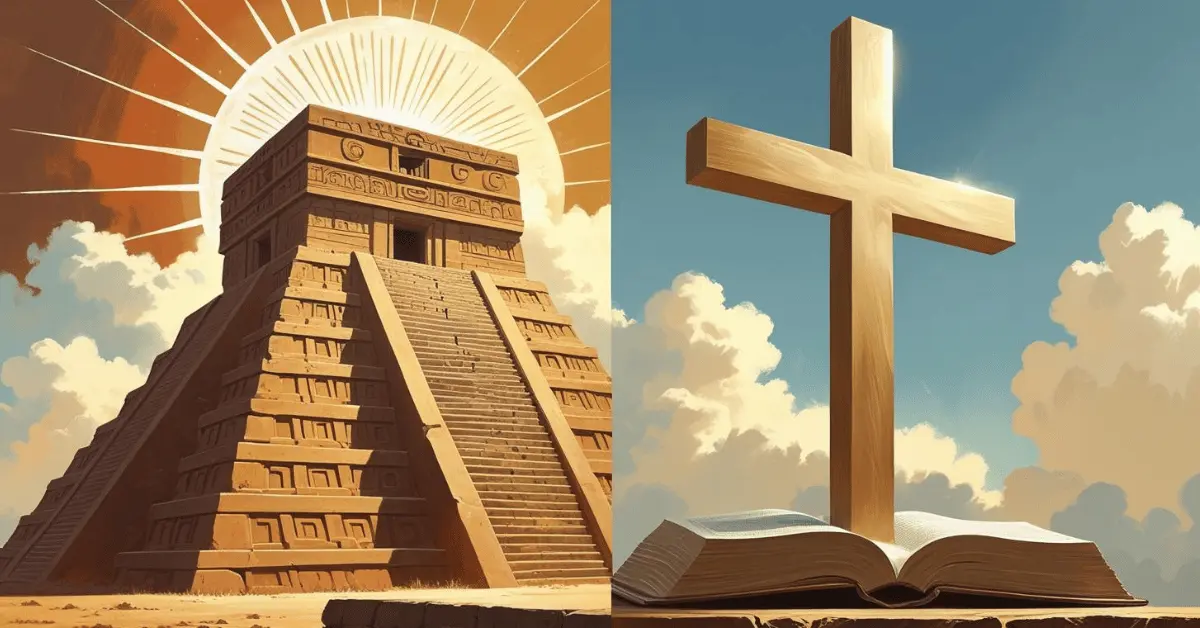Many Christians feel curious about Toltec wisdom but unsure how it fits with their faith. Ideas about inner freedom and personal awareness can sound meaningful, yet Christianity is grounded in truth, grace, and surrender to God. This contrast often creates quiet confusion rather than clarity.
What Is Toltec Wisdom?
Toltec wisdom comes from an ancient civilization in central Mexico, but today it is understood more as a philosophy than a religion. It focuses on personal awareness, breaking harmful thought patterns, and taking responsibility for words, beliefs, and actions.
Modern Toltec teachings, popularized by The Four Agreements, emphasize inner freedom rather than worship or devotion. This inward focus is what attracts many people while also raising questions for those whose faith centres on God rather than self-guided transformation.
What Is Christianity?
Christianity is centred on the person of Jesus Christ, not on human philosophy or self-derived wisdom. Christians believe that Jesus is the Son of God who entered the world, gave His life on the cross for humanity’s sins, and rose again, offering salvation through faith.
The Bible serves as the foundation of Christian belief and guides how believers understand truth, purpose, and transformation. Rather than focusing on self-improvement alone, Christianity teaches that lasting change comes through God’s grace and a restored relationship with Him.
Similarities Between Toltec Wisdom and Christianity
- Words Matter: Both teach that words shape reality. Toltec wisdom stresses speaking with integrity, while Christianity calls believers to speak truth with love.
- Inner Renewal: Each recognizes that change begins in the mind. Toltec wisdom focuses on releasing harmful beliefs, while Christianity emphasizes renewal through God’s truth.
- Peaceful Living: Both value peace. Toltec wisdom seeks harmony and balance, and Christianity encourages believers to become peacemakers.
- Personal Responsibility: Accountability is central to both. Toltec wisdom highlights ownership of choices, while Christianity teaches that actions should reflect faith in God.
Key Differences Between Toltec Wisdom and Christianity
- View of God: Toltec wisdom does not centre on a personal God but on awareness and inner harmony. Christianity is built on belief in one eternal God revealed as Father, Son, and Holy Spirit.
- Path to Transformation: Toltec wisdom looks inward, teaching that change comes through personal awareness and effort. Christianity looks upward, teaching that true transformation comes through God’s Spirit at work within the believer.
- Source of Authority: Toltec wisdom draws from oral traditions and modern teachers. Christianity relies on the Bible as the inspired and authoritative Word of God.
- Hope Beyond This Life: Toltec wisdom focuses mainly on freedom and balance in the present life. Christianity offers hope that extends beyond this world through eternal life in the presence of God.
Can Toltec Wisdom and Christianity Coexist?
Many believers wonder whether Toltec wisdom and Christianity can exist together. The answer depends on depth. Christianity is not only moral guidance. It is surrender to God and trust in Christ. When Toltec ideas move from tools into truth, faith confusion begins.
Is Toltec Wisdom Compatible With Christian Faith?
At a surface level, some Toltec ideas sound helpful. At a deeper level, Christianity teaches that truth is revealed by God, not discovered through self-awareness alone. Because of this, full compatibility is not possible without changing core Christian beliefs.
Christian Perspective on Toltec Teachings
Christianity recognizes fear, inner struggle, and brokenness. The difference lies in the solution. Toltec wisdom looks inward for freedom. Christianity looks to God’s grace. Scripture, not personal insight, remains the final guide for believers.
Spiritual Discernment in Modern Spiritual Culture
Popular spirituality often blends ancient wisdom with self-help language. Toltec wisdom fits easily into this trend. Christians are called to discern what shapes belief, not just what feels helpful. Wisdom without God can still mislead.
Self-Help Spirituality vs Biblical Faith
Self-help spirituality emphasizes independence and inner power. Biblical faith emphasizes dependence on God and transformation through grace. This difference explains why similar language does not always lead to the same spiritual direction.
Why This Comparison Matters Today
Believers face constant exposure to mixed spiritual messages. Understanding the difference between Toltec wisdom and Christianity helps prevent quiet faith drift. What shapes belief ultimately shapes life, hope, and eternity.
Common Questions
Is Toltec wisdom a religion?
Not exactly. It is more of a philosophy or lifestyle guide than an organized religion.
Do Christians ever use Toltec teachings?
Some may use them for reflection, but their ultimate authority remains the Bible.
Can Toltec wisdom save a person?
From a Christian perspective, no. Salvation comes through faith in Jesus Christ alone.

